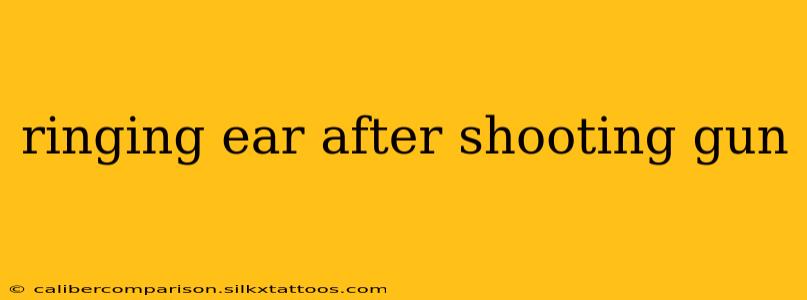Shooting guns, whether for sport, hunting, or self-defense, can be a fun and necessary activity for many. However, it's crucial to understand the potential risks involved, especially the risk of hearing damage. A common complaint among shooters is a ringing in the ears, medically known as tinnitus, after firing a weapon. This post will explore the causes of this condition, its severity, and most importantly, how to prevent it.
Understanding the Link Between Gunfire and Tinnitus
The loud noise produced by firearms is the primary culprit behind post-shooting tinnitus. The intense sound waves generated during discharge can overwhelm the delicate hair cells within the inner ear, responsible for transmitting sound signals to the brain. This damage can be temporary, manifesting as a brief ringing sensation, or permanent, leading to chronic tinnitus that persists long after the shooting session. The severity of the damage depends on several factors, including:
- The type of firearm: Higher-caliber weapons generally produce louder noises than smaller calibers, increasing the risk of hearing damage.
- Distance from the firearm: Being closer to the gun during discharge exposes your ears to a more intense sound wave, significantly increasing the risk of tinnitus.
- Hearing protection: The use (or lack thereof) of proper hearing protection is the most critical factor. Adequate hearing protection significantly reduces the risk of both temporary and permanent hearing loss.
- Duration of exposure: Extended periods of shooting without breaks can increase the cumulative effect of noise exposure, exacerbating the risk.
Types of Hearing Protection: A Closer Look
Choosing the right hearing protection is paramount. Several options exist, each with its benefits and limitations:
- Earmuffs: These provide excellent noise reduction across a broad frequency range, effectively protecting against the loud impulsive noises of gunfire. Look for muffs with a high Noise Reduction Rating (NRR).
- Ear Plugs: These are more compact and discreet but require proper insertion for optimal effectiveness. Consider using custom-molded earplugs for a superior fit and noise reduction.
- Combination Protection: Using both earmuffs and earplugs offers the highest level of protection, significantly reducing the risk of hearing damage.
Recognizing and Managing Post-Shooting Tinnitus
Temporary tinnitus after shooting is often characterized by a ringing, buzzing, hissing, or clicking sound in one or both ears. It typically fades within a few hours or days. However, if the ringing persists, worsens, or is accompanied by other symptoms like hearing loss or dizziness, seek immediate medical attention. A hearing healthcare professional can properly diagnose the extent of the damage and recommend appropriate treatment options.
Prevention is Key: Protecting Your Hearing on the Range
The best approach to dealing with tinnitus after shooting is prevention. Always prioritize hearing safety by adhering to these guidelines:
- Always wear hearing protection: Never fire a firearm without appropriate hearing protection.
- Choose high-quality hearing protection: Invest in earmuffs or earplugs with a high NRR.
- Maintain a safe distance: Increase the distance between yourself and the firearm when possible.
- Take breaks: Regular breaks during shooting sessions allow your ears to recover from noise exposure.
- Regular hearing check-ups: Schedule regular hearing exams, especially if you frequently engage in shooting activities.
Ignoring hearing protection can lead to irreversible hearing loss and chronic tinnitus. By consistently employing these preventative measures, you can enjoy your shooting activities while protecting your hearing health for years to come. Your hearing is invaluable – protect it!

